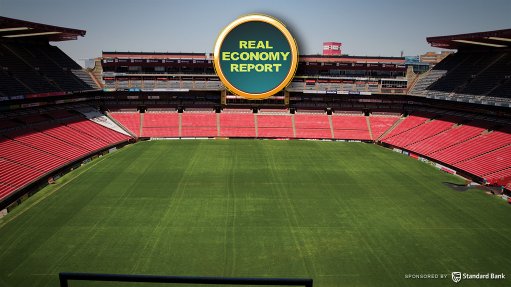
From Creamer Media in Johannesburg, this is the Real Economy Report. German consulting firm Transsolar Energietechnick visited the Ellis Park stadium, in Johannesburg, for an energy audit aimed at reducing the stadium’s energy usage and subsequent costs. Leandi Kolver has the story.
Leandi Kolver:
The audit, which was part of a project supported by the South Africa German Energy Programme, a partnership between the German Development Corporation, or GIZ, South Africa’s Department of Energy and the South African National Energy Development Institute, covered the entire Ellis Park precinct, including the rugby stadium and adjacent swimming pool, athletics stadium and indoor arena, and involved aspects such as the energy consumption of floodlights, pumps, hot water, audio and electrical appliances in the hospitality suites and restaurants.
Transsolar CE Professor Volkmar Bleicher explains Transsolar’s approach to saving energy.
Transsolar CE Professor Volkmar Bleicher:
There are three important steps and the first one is always to reduce the energy demand. The second step is always to optimise the energy efficiency, and the third step is to use renewable energies.
Leandi Kolver:
During his time at Ellis Park, Bleicher noticed various areas that could be improved upon.
Professor Volkmar Bleicher:
Up to now we saw a lot of things we can do. Two important things are firstly the installation of the lights, that is a huge power installation and we can reduce it for example by 80%, and the energy demand by 50%, and the second thing is that the fridges on the area are nearly 300 parts, and there we can also optimise it by 50%.
Leandi Kolver:
Other areas that Transsolar earmarked for improvement include the stadium’s ice machines that were currently positioned in direct sunlight without any shading or sufficient insulation and the boiler piping that was not insulated. Further, Transsolar also recommended the installation of photovoltaic panels on the northern roof of the stadium.
Bleicher said that, should these measures be implemented, Ellis Park could significantly reduce its electricity consumption and bill, which was currently just below R400 000 a month.
Professor Volkmar Bleicher:
The overall save is nearly 40% by demand and 40% by the maximum peak load. So that is absolutely enough. Typically in stadias around the world we have a saving potential up to 40% to 60%. That is the maximum.
Shannon de Ryhove:
Other news making headlines this week: Convergence Partners’ new partnership will inject millions into Africa’s ICT infrastructure; The Green Building Council of South Africa launches its pilot socioeconomic rating tool; and the DCD recapitalisation programme is a prime example of the industrialisation of the South African economy.
Investment management firm Convergence Partners has unveiled a new multimillion rand infrastructure fund to accelerate the development of information and communications technology infrastructure throughout Africa.
Convergence Partners chairperson Andile Ngcaba
In a bid to acknowledge the socioeconomic achievements of new green building projects and refurbishments, the Green Building Council of South Africa has launched the pilot Socioeconomic Category for Green Star South Africa rating tools.
GBCSA CEO Brian Wilkinson
Johannesburg-based locomotive solutions provider DCD Rolling Stock officially launched Phase 1 of its R240-million recapitalisation programme at its Boksburg manufacturing facility, reaffirming its commitment to the industrialisation of South Africa’s economy.
Public Enterprises Minister Malusi Gigaba
That’s Creamer Media’s Real Economy Report. Join us again next week for more news and insight into South Africa’s real economy.